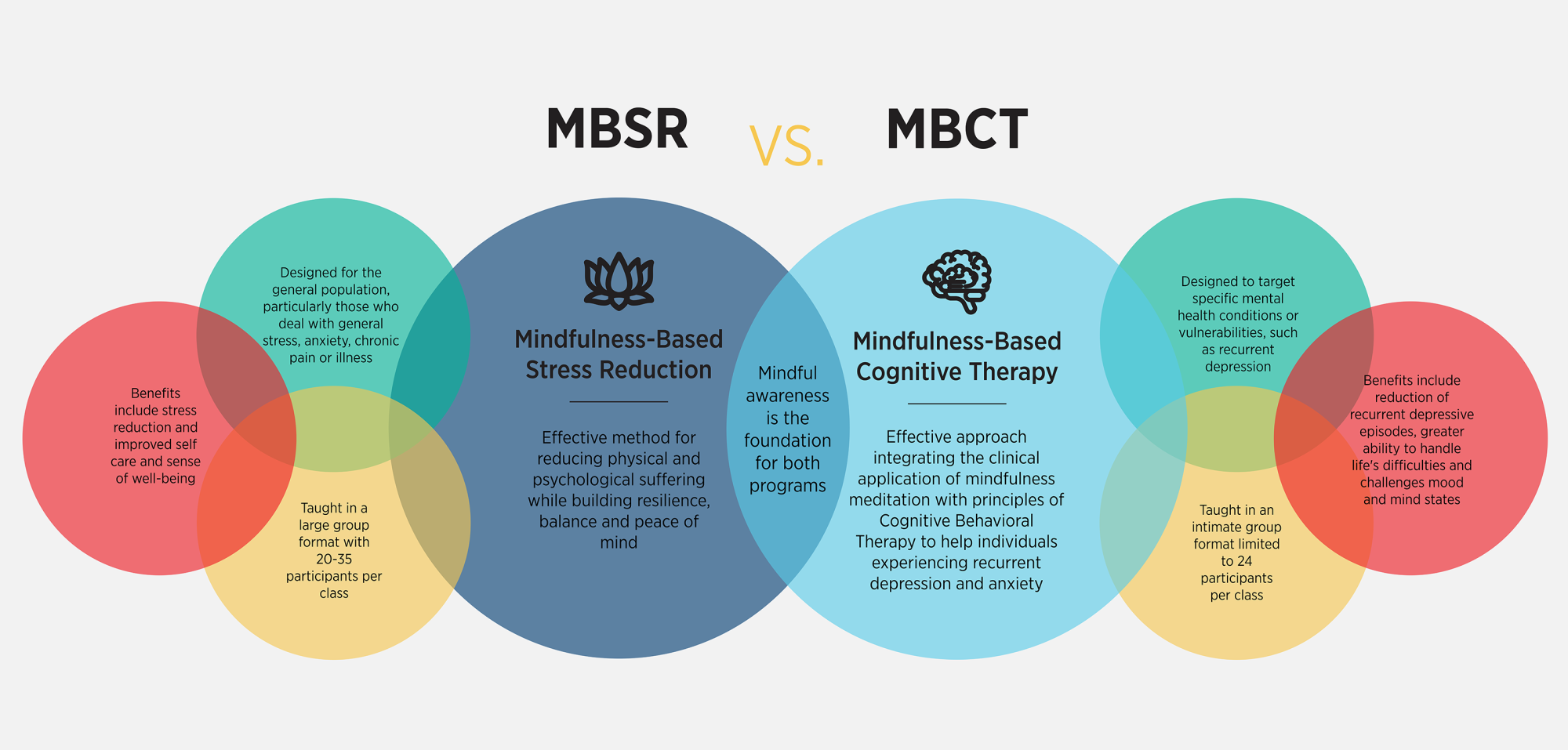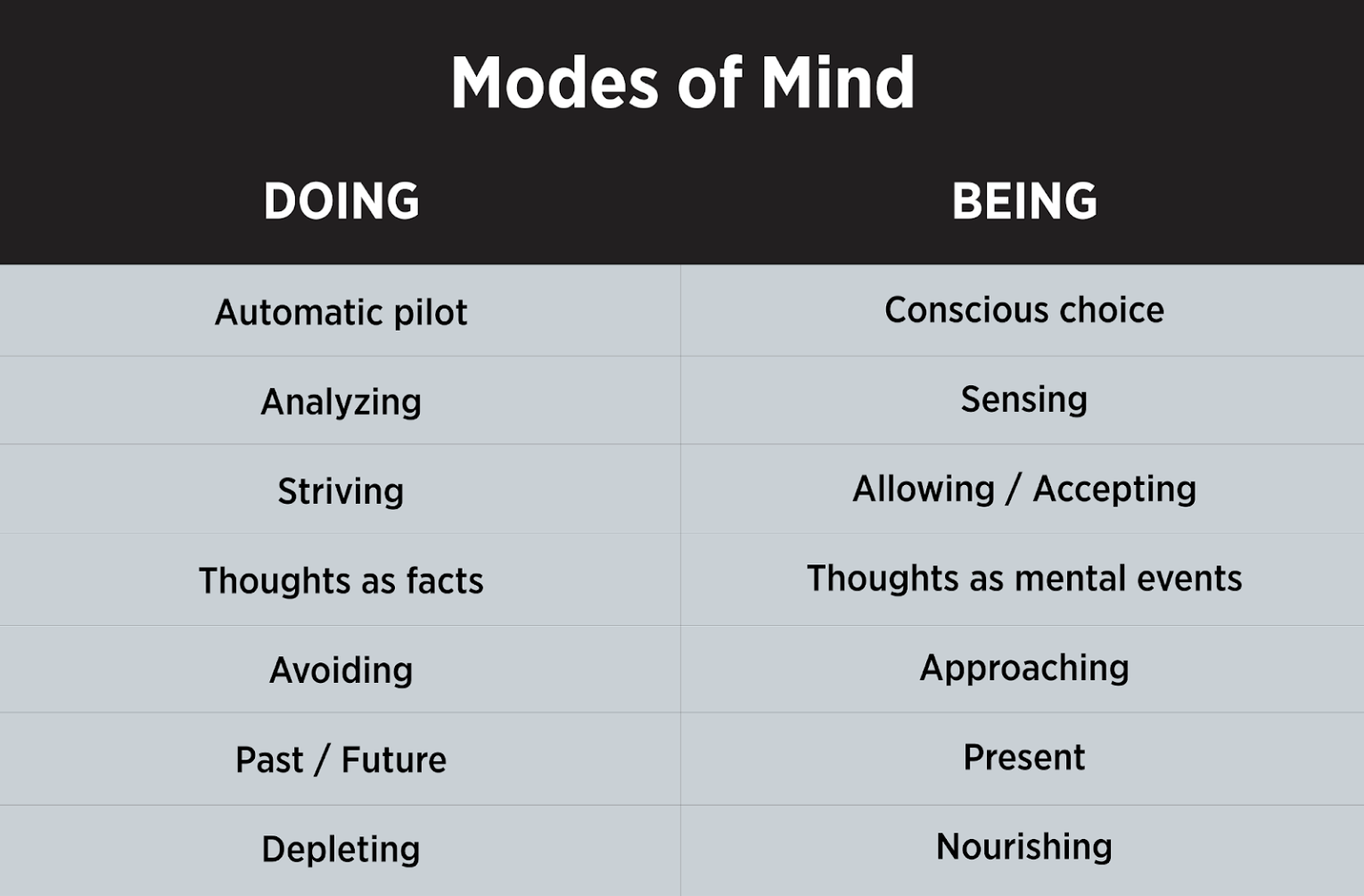
Comparing evidence-based mindfulness programs: MBSR vs. MBCT
Delve into the differences between Mindfulness-Based Stress Reduction and Mindfulness-Based Cognitive Therapy to find the perfect instructor-led program for your mindfulness journey.
Mindfulness practices have become increasingly popular in recent years, offering a range of benefits for mental and emotional well-being. From convenient apps and personal meditation practice to instructor-led workshops and programs, the options are extensive.
Although mindfulness practice is flexible and there is no “right way” to engage, a pivotal element of your mindfulness journey may be determining which practices align with your growth, health and well-being goals.
Whether you are just starting your mindfulness journey or seeking to reinvigorate your practice, participating in a formal instructor-led program may be the most effective in reaching those aspirations.
Choosing a mindfulness program
Two prominent instructor-led, mindfulness programs, Mindfulness-Based Stress Reduction (MBSR) and Mindfulness-Based Cognitive Therapy (MBCT), have gained recognition for their evidence-based approaches to enhancing mindfulness and alleviating stress.
But how do you determine which program is best for you? Ahead, we’ll explore each program in more depth to help make your choice a mindful one.

MBSR: Embracing resilience in stressful times
What is MBSR?
Founded by Jon Kabat-Zinn in 1979, Mindfulness-Based Stress Reduction is based on ancient contemplative practices integrated with western medical approaches. It is an effective method for reducing physical and psychological suffering while building resilience, balance and peace of mind. MBSR is a nonsectarian, scientifically researched approach that is in harmony with any faith-based tradition.
What can I expect during the program?
MBSR is an eight-week, evidence-based and experiential program. It is designed for the general population, particularly for those who deal with general stress, anxiety, chronic pain and/or illness, or who are interested in a greater sense of well-being. It provides individuals with practical mindfulness practices and approaches to enhance awareness, reduce the physical and emotional toll of stress, and put one in touch with inner resources.
The program begins with an orientation that introduces participants to the secular practice of mindfulness and describes the science behind it. The next eight weeks cover sessions on the role of perception, the power and pleasure of being present, habitual stress reactivity and more.
MBSR is often taught in a large group format with approximately 20-35 participants per class.
What practices are introduced in MBSR?
MBSR employs a range of formal mindfulness practices including the body scan, attentional focus practice and mindful movement. Informal practices are also introduced to incorporate in one’s daily life.
What are the benefits of MBSR?
Scientific studies at medical and research centers around the world, including the Mindfulness Center at Brown, suggest that MBSR can positively and often profoundly affect participants’ lives. Benefits include:
- Stress reduction
- Improved self-care
- Improvement in symptoms of burnout
- Clearer recognition of when your attitude or mood is beginning to change so you can become less reactive
- Improved sense of well-being and learning how to be present and appreciate the simple pleasures of everyday life
MBCT: A mindful approach to depression and anxiety
What is MBCT?
Mindfulness-Based Cognitive Therapy co-developed by Zindel Segal, Mark Williams and John Teasdale, is an adaptation of MBSR. MBCT combines training in mindfulness practices and approaches with principles and activities of cognitive behavioral therapy to help individuals better understand, manage and relate differently to negative thoughts, feelings and patterns of reactivity that contribute to recurrent depression and anxiety.
The heart of MBCT lies in becoming acquainted with the modes of mind (“being” mode and “doing” mode) that often characterize and contribute to mood disorders, while simultaneously learning to develop a new relationship with them.

While MBSR is designed for the general public, MBCT tends to target specific mental health conditions or vulnerabilities and is most beneficial for:
- Those who experience recurrent depression, chronic sadness and anxiety
- Those interested in learning new ways of relating to unwanted and challenging thought patterns and related feelings, and to respond to them more skillfully
What can I expect during the program?
MBCT is an eight-week, evidence-based and experiential program designed to help participants break free from patterns that contribute to repeated and prolonged episodes of depression and anxiety.
Similar to MBSR, the program begins with an orientation, which is a great opportunity to learn whether the program is a good fit. The next eight weeks include sessions on awareness and automatic pilot, living in our heads, recognizing aversion, the role of allowing and letting be in responding to difficulties and how to best take care of oneself.
MBCT is taught in a group format limited to 24 participants. Exploring shared experiences and challenges foster learning, a sense of connection and transformation.
Each class includes a mix of mindfulness meditation practice, large and small group sharing, exploring session themes and content through activities and dialogue, and review of between session home practice.
What practices are introduced in MBCT?
MBCT provides training in a range of formal mindfulness meditation practices including the body scan, attentional focus practice, mindful movement and brief practices and activities that can be integrated into one’s daily life.
MBCT differs from conventional Cognitive Behavioral Therapy (CBT) as it does not emphasize working directly with the content or changing belief in thought patterns. The focus in MBCT is on cultivating awareness and applying the self-awareness, attention control and emotion regulation that can occur as a result of regular mindfulness practice to thought patterns, present moment experiences, presence of body sensations and mood states that may indicate or trigger a relapse or prolong or worsen existing difficulties. Seeing these patterns more clearly, with a bit of distance offers the possibility of gaining new and different perspectives and responding in ways that foster well-being.
What are the benefits of MBCT?
- Greater ability to handle life’s difficulties and challenges mood and mind states
- Helps one make a radical shift in their relationship to thoughts, feelings and body sensations that contribute to depressive relapse and other challenging mood states
- Reduction in the intensity, frequency and duration of recurrent depressive episodes
- Cultivates greater attentional control, emotional responsiveness and regulation, and self awareness
- Decentering from experience, relating to thoughts, feelings, body sensations and impulses to act as events passing in the mind and body rather than identifying with them
Which program is best for you?
While both MBSR and MBCT have mindfulness at their core, they serve different purposes and target distinct audiences. MBSR is a versatile program designed for general stress reduction and improved well-being, while MBCT specializes in recognizing and discovering new ways of relating and responding to patterns of thought, feelings, body sensations and impulses to act that contribute to or worsen recurrent depression, anxiety and other challenging mood states.
Choosing between these two depends on individual needs, whether you're seeking stress relief or a structured program to manage recurrent depression. Regardless of the choice, both practices can profoundly impact your mental and emotional well-being, offering valuable tools for navigating life's challenges.
Get Started
In collaboration with the Mindfulness Center at Brown, the School of Professional Studies provides a variety of programs for newcomers, seasoned practitioners and teachers in-training.